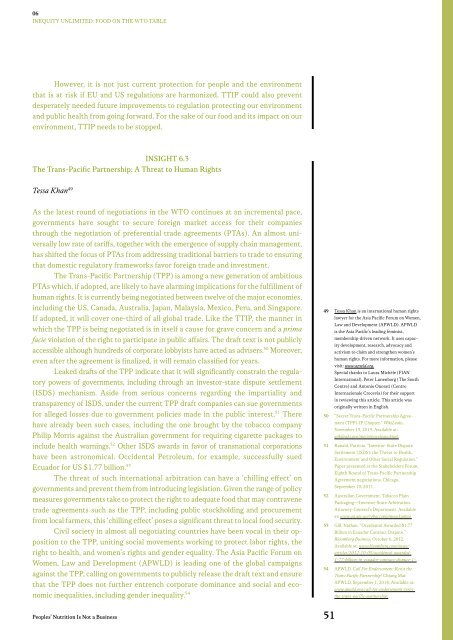RIGHT TO FOOD AND NUTRITION WATCH
1iNBHTY
1iNBHTY
You also want an ePaper? Increase the reach of your titles
YUMPU automatically turns print PDFs into web optimized ePapers that Google loves.
06<br />
INEQUITY UNLIMITED: <strong>FOOD</strong> ON THE W<strong>TO</strong> TABLE<br />
However, it is not just current protection for people and the environment<br />
that is at risk if EU and US regulations are harmonized. TTIP could also prevent<br />
desperately needed future improvements to regulation protecting our environment<br />
and public health from going forward. For the sake of our food and its impact on our<br />
environment, TTIP needs to be stopped.<br />
INSIGHT 6.3<br />
The Trans-Pacific Partnership: A Threat to Human Rights<br />
Tessa Khan 49<br />
As the latest round of negotiations in the W<strong>TO</strong> continues at an incremental pace,<br />
governments have sought to secure foreign market access for their companies<br />
through the negotiation of preferential trade agreements (PTAs). An almost universally<br />
low rate of tariffs, together with the emergence of supply chain management,<br />
has shifted the focus of PTAs from addressing traditional barriers to trade to ensuring<br />
that domestic regulatory frameworks favor foreign trade and investment.<br />
The Trans-Pacific Partnership (TPP) is among a new generation of ambitious<br />
PTAs which, if adopted, are likely to have alarming implications for the fulfillment of<br />
human rights. It is currently being negotiated between twelve of the major economies,<br />
including the US, Canada, Australia, Japan, Malaysia, Mexico, Peru, and Singapore.<br />
If adopted, it will cover one-third of all global trade. Like the TTIP, the manner in<br />
which the TPP is being negotiated is in itself a cause for grave concern and a prima<br />
facie violation of the right to participate in public affairs. The draft text is not publicly<br />
accessible although hundreds of corporate lobbyists have acted as advisers. 50 Moreover,<br />
even after the agreement is finalized, it will remain classified for years.<br />
Leaked drafts of the TPP indicate that it will significantly constrain the regulatory<br />
powers of governments, including through an investor-state dispute settlement<br />
(ISDS) mechanism. Aside from serious concerns regarding the impartiality and<br />
transparency of ISDS, under the current TPP draft companies can sue governments<br />
for alleged losses due to government policies made in the public interest. 51 There<br />
have already been such cases, including the one brought by the tobacco company<br />
Philip Morris against the Australian government for requiring cigarette packages to<br />
include health warnings. 52 Other ISDS awards in favor of transnational corporations<br />
have been astronomical. Occidental Petroleum, for example, successfully sued<br />
Ecuador for US $1.77 billion. 53<br />
The threat of such international arbitration can have a ‘chilling effect’ on<br />
governments and prevent them from introducing legislation. Given the range of policy<br />
measures governments take to protect the right to adequate food that may contravene<br />
trade agreements such as the TPP, including public stockholding and procurement<br />
from local farmers, this ‘chilling effect’ poses a significant threat to local food security.<br />
Civil society in almost all negotiating countries have been vocal in their opposition<br />
to the TPP, uniting social movements working to protect labor rights, the<br />
right to health, and women’s rights and gender equality. The Asia Pacific Forum on<br />
Women, Law and Development (APWLD) is leading one of the global campaigns<br />
against the TPP, calling on governments to publicly release the draft text and ensure<br />
that the TPP does not further entrench corporate dominance and social and economic<br />
inequalities, including gender inequality. 54<br />
49 Tessa Khan is an international human rights<br />
lawyer for the Asia Pacific Forum on Women,<br />
Law and Development (APWLD). APWLD<br />
is the Asia Pacific’s leading feminist,<br />
membership-driven network. It uses capacity<br />
development, research, advocacy and<br />
activism to claim and strengthen women’s<br />
human rights. For more information, please<br />
visit: www.apwld.org.<br />
Special thanks to Laura Michéle (FIAN<br />
International), Peter Lunenborg (The South<br />
Centre) and Antonio Onorati (Centro<br />
Internazionale Crocevia) for their support<br />
in reviewing this article. This article was<br />
originally written in English.<br />
50 “Secret Trans-Pacific Partnership Agreement<br />
(TPP)-IP Chapter.” WikiLeaks,<br />
November 13, 2013. Available at:<br />
wikileaks.org/tpp/pressrelease.html.<br />
51 Ranald, Patricia. “Investor-State Dispute<br />
Settlement (ISDS): the Threat to Health,<br />
Environment and Other Social Regulation.”<br />
Paper presented at the Stakeholders Forum,<br />
Eighth Round of Trans-Pacific Partnership<br />
Agreement negotiations, Chicago,<br />
September 10, 2011.<br />
52 Australian Government. Tobacco Plain<br />
Packaging—Investor-State Arbitration.<br />
Attorney-General’s Department. Available<br />
at: www.ag.gov.au/tobaccoplainpackaging.<br />
53 Gill, Nathan. “Occidental Awarded $1.77<br />
Billion in Ecuador Contract Dispute.”<br />
Bloomberg Business, October 6, 2012.<br />
Available at: www.bloomberg.com/news/<br />
articles/2012-10-05/occidental-awarded-<br />
1-77-billion-in-ecuador-contract-dispute-1-.<br />
54 APWLD. Call For Endorsement: Resist the<br />
Trans-Pacific Partnership! Chiang Mai:<br />
APWLD, September 1, 2014. Available at:<br />
www.apwld.org/call-for-endorsement-resistthe-trans-pacific-partnership.<br />
Peoples’ Nutrition Is Not a Business 51


